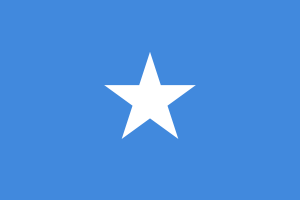Language/Somali/Grammar/Nouns
Hi Somali learners! 😊
In this lesson, we will be delving into the fascinating world of Somali nouns. We will cover the basics of how to form and use them, as well as explore some deeper cultural concepts related to nouns that will give you a deeper understanding of the Somali language.
Introduction[edit | edit source]
In Somali, nouns are words that refer to a person, place, thing, or idea. Like in English, they serve as the building blocks of sentences and are used to convey meaning. However, unlike in English, Somali nouns do not have genders (masculine/feminine) or articles (the/a/an). Instead, they rely on certain markers and endings to indicate various grammatical functions.
Take a moment to explore these relevant pages as you conclude this lesson: Conditional Mood, Possession, 0 to A1 Course & Adjective Agreement.
Number[edit | edit source]
In Somali, nouns use a system of number that is somewhat similar to English. However, there are some important differences to keep in mind. Specifically, Somali nouns can be singular or plural, and the plural is formed in a number of different ways. Here are some examples:
| Somali | Pronunciation | English |
|---|---|---|
| ilmo | ʿilmo | book (singular) |
| ilmooyin | ʿilmo-oyin | books (plural) |
| gabadh | gab-dho | girl (singular) |
| gabadho | gab-dho | girls (plural) |
| duleed | du-leed | mountain (singular) |
| dulmada | dulma-da | mountains (plural) |
Notice that plural markers can take on slightly different forms depending on the noun. Some plural markers end in -o (ilmooyin and gabadho), while others end in -ada (dulmada). In some cases, the final vowel of the word changes entirely, as in the case of gabadh and gabadho. Note also that there is no "the" in front of the noun in Somali, even in the plural form.
Gender[edit | edit source]
Unlike in many other languages, Somali nouns do not have gender. This means that there is no distinction between "masculine" and "feminine" nouns, as there is in French, Spanish, or Arabic. Instead, Somali relies on other markers to indicate who or what is being referred to. For example, you may choose to use a personal pronoun (like "he" or "she"), or you may use a different noun along with the original noun to indicate gender.
Here's an example of how gender is expressed in Somali:
- Person 1: Hooyadii waxaa qabaa <%=ಠ‿ಠ%> ("What did your mother cook?")
- Person 2: Aa, wiilkadeedu maanta dhilladii samakay.<%=♥‿♥%> ("Ah, my son made fish soup today.")
Notice that in the second sentence, the speaker uses the word "wiilka" to refer to the son, which means "boy" or "son". By using this word, the speaker makes it clear that she is referring to a male child, without having to add any other markers.
Possession[edit | edit source]
When it comes to possession, Somali has a somewhat unique system that relies on attaching suffixes to nouns to indicate ownership. Here are some examples:
| Somali | Pronunciation | English |
|---|---|---|
| buug | buug | book |
| buugga | buug-ga | my book |
| buuggan | buug-gan | your book (singular) |
| buuggii | buug-gii | his/her book |
Notice that the suffix -ga indicates that the noun is possessed by the speaker (first person), while -ka indicates that the noun is possessed by the listener (second person). Meanwhile, the suffix -kaa indicates that the noun is possessed by a third person. There are many other possession markers in Somali, which we will explore more in another lesson.
Interesting Facts[edit | edit source]
- The Somali language is spoken by approximately 15 million people worldwide, primarily in Somalia and parts of Ethiopia, Kenya, and Djibouti. It is part of the Cushitic branch of the Afro-Asiatic language family. - The Somali language has a long and rich literary tradition, dating back to at least the thirteenth century. Many famous Somali poets and writers have contributed to this tradition, which is still alive and well today. - Somali nouns often reflect cultural and historical attitudes towards various objects and concepts. For example, the word "dhaqan" (culture) is derived from the word "dheg" (fire), which was used in ancient times to ward off evil spirits during rituals and ceremonies. This shows the importance of culture in Somali society and the deep connection that Somalis have with their traditions.
To improve your Somali Grammar, you can also use the Polyglot Club website. Find native speakers and ask them any questions!
Sources[edit | edit source]
- Somali grammar - Wikipedia
- BEGINNER'S SOMALI GRAMMAR
- Somali grammar and miscellaneous Flashcards | Quizlet
Videos[edit | edit source]
Somali Grammar 3.2.5.2 Nouns with general number - YouTube[edit | edit source]
Other Lessons[edit | edit source]
- Questions
- Prepositions
- Conditional Mood
- Pronouns
- How to Use Be
- Time
- Give your Opinion
- Gender
- Adverbs

